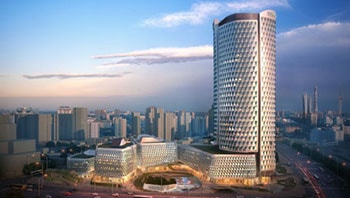Once the most aggressive developer in Shanghai, SOHO China is reported to be selling three of the 12 projects that it has acquired in Shanghai as the firm may be struggling to implement all of the buildings in its pipeline.
The three projects, one in Jing’An district and the other two in Hongkou, were all purchased from other developers in 2011, and now — according to a report by Esther Fung in the Wall Street Journal — are being sold off. An investigation of the sites has shown that the company has failed to make significant progress since acquiring the projects.
The pricing for the rumoured asset sales remains unclear, and SOHO would not confirm the transactions when contacted by media representatives.
Velociraptor Beijing Developer Adjusting to New Age
During 2013 as land sales, as well as land values, have been hitting record levels, SOHO has been conspicuously absent from the headlines, compared to 2011 and 2012 when they were the most aggressive acquirer of assets in Beijing and Shanghai.
Zhang Xin Beats Out Brad Pitt for Manhattan Town-House
The Beijing-based developer jointly controlled by China real estate glamour couple Pan Shiyi and his wife Zhang Xin had been aggressively acquiring commercial property assets in Shanghai since SOHO entered the eastern China market with the acquisition of The Exchange on Tongren Lu from Morgan Stanley in 2009.
In all, the company acquired 12 projects in Shanghai over the four year period, with most of the acquisitions taking place in 2011 and 2012, before the company changed its business model.
Stretching to Grab Shanghai Real Estate
A number of possible rationales have been put forward to explain SOHO’s change in tack including cash flow difficulties due to their new business model, growing pessimism about demand of office space in Shanghai, as well as the company’s inability to finance and execute the completion of its many projects.
The upcoming sale of assets only adds to the notion that SOHO is encountering challenges while shifting to its new business model. While SOHO’s debt to equity ratio was only 14.3% at the end of June, of the 12 projects that it has acquired in Shanghai since 2009, most of them have yet to be completed.
Adding to the pressure on SOHO in Shanghai, office rents in prime areas such as West Nanjing Road, have already begun to fall according to brokers familiar with the market. And the supply of office space in decentralised locations, such as SOHO has chosen for most of its projects, continues to grow rapidly.
Slow Progress in Challenging Locations
The three projects that SOHO is unloading are all in downtown districts, but none of them are in prime office locations in Shanghai, and all are still in the early stages of construction.
SOHO Hailun
The company purchased the 28,103 square metre site for SOHO Hailun, near Hailun Road and adjacent to North Sichuan Road in Hongkou District, for RMB 2.47 billion in April 2011. Piling is still underway on the project with no above-ground construction completed.
Sichuan Road Metro Station Project
The second project reportedly up for sale is not listed among the company’s portfolio of properties on the SOHO China website, however, SOHO acquired the 16,426 square metre site at 10 Hainan Road, Hongkou District during November 2012 for RMB 1.5 billion. At this project, the company has built up to the fourth floor.
SOHO Jing An
Also in April 2011, the company acquired a 15,000 sqm site along Wanhangdu Road, in the Caojiadu area of Shanghai’s Jing An district for RMB 1.6 billion. SOHO Jing An has apparently yet to begin the piling stage.
Flipping Unfinished Projects
While no buyer has been disclosed for SOHO’s three projects, the likeliest candidates are competing developers who would have the means to complete construction on the projects and begin marketing the space to prospective tenants.
According to some industry analysts, SOHO may be able to reap as much as RMB 7 billion from selling the three projects, beyond what it has already invested. Considering that the company’s original outlay was approximately 5.57 billion, and it may have invested another 30 percent of additional capital for its progress to date, SOHO would be gaining a substantial windfall for holding these projects over the last two years.
Given that Shanghai’s declining office rentals might mean investment yields of less than 5% for SOHO if it were to continue to hold these assets, and there may be ready buyers in the market, selling now becomes an attractive proposition.


Leave a Reply